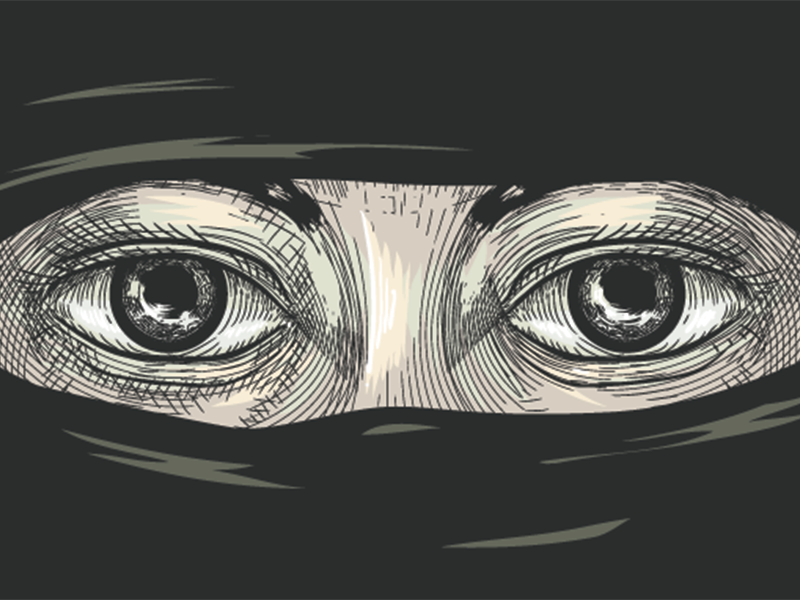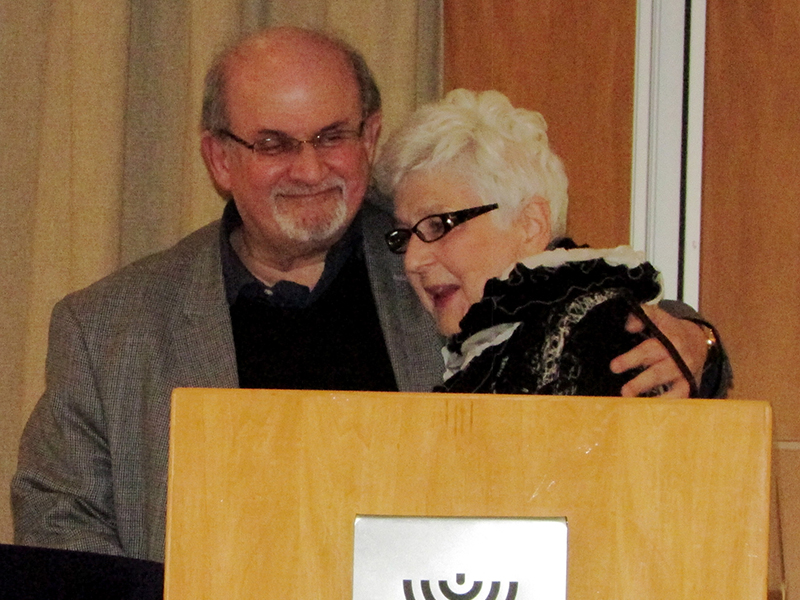Muslim women in the free world who voluntarily cover their faces are abetting the oppression of women in places where they have no choice, argues acclaimed author Salman Rushdie.
Responding to an audience question at the Jewish Public Library in Montreal on Oct. 23, Rushdie said he could not comment directly on Quebec’s new religious neutrality law, but, he said, his Muslim family has strong views on the practice.
“Not even the religious members would accept wearing a veil. They would say it is an instrument of oppression,” he said.
“Muslim women in the West who see it as an expression of identity are guilty of what Karl Marx called ‘false consciousness.’ A lot of women are forced to wear the veil. To choose to wear it, in my view, assists in the oppression of their sister(s) in those parts of the world,” he said to restrained applause from the capacity crowd of more than 700. Rushdie described himself as an atheist.
Sponsored by the Max Margles Memorial Fund, as part of Jewish Book Month, the event’s tickets (general admission was $30) were sold out weeks in advance. Security was tight, with both private guards and Montreal police present at the event.
Rushdie lived in hiding under police protection for nine years after former Iranian supreme leader Ayatollah Khomeini issued a fatwa against him in 1989, which put a hefty bounty on his head. The edict followed the publication of his novel, The Satanic Verses, which angered many Muslims, due to its perceived blasphemy.
READ: REJECTION OF THE NIQAB IS SELF-DEFENCE, NOT RACISM
Rushdie, 70, glossed over the affair. “I’m happy I’m still here. Broadly speaking, I’m still the same person I was. I would have preferred not to go through it, but it was 20 years ago, a long time ago, an earlier chapter,” he said.
The Indian-born author who now lives in the United States, after many years living in Britain, proved to be an enlightening and entertaining speaker, mixing intellectual observations with amusing anecdotes.
His reflections on “Public Events, Private Lives: Literature and Politics in the Modern World” explored the enduring power of literature to tell the truth in a time of “fake news,” when “the very nature of reality is so contested.”
“Paradoxically, with so many other ways to get information, with more and more people … telling us what is happening in the world, our hold on the truth has weakened,” he said.
“The Internet is responsible for a lot of the confusion. It is an enormous field where complete garbage and facts co-exist on the same level of authority.”
He was highly critical of U.S. President Donald Trump’s “lies,” labelling the atmosphere he is engendering as “the Trump inversion.”

Rushdie is currently teaching in New York University’s journalism department. He expressed high regard for journalists, who he said are being killed in greater numbers than ever before by authoritarian rulers who do not like what they report.
“Yet journalists are not popular. Market research shows the press is not liked or trusted, which long precedes the current U.S. administration. So when Trump attacks the media, it falls on receptive ears, and that is dangerous,” said Rushdie.
He deplored how few translated books of fiction are being published in North America, under two per cent annually, he said. In western Europe, on the other hand, the figure is around 25 to 30 per cent.
“This means that American readers do not have the opportunity to learn how people think and feel in the rest of the world,” which has always been an important role of literature.
He urged people to embrace multiple identities. “It’s hard to find common ground with other people when we define ourselves too narrowly.” Fictional characters in good novels teach how complex and contradictory humans are, he said.
Like journalists, fiction writers are in the business of telling the truth as they see it, he said. That’s why they so often clash with politicians who also want to portray the world – to their advantage.
Rushdie ran into trouble with another ruler well before Khomeini’s condemnation. Indian Prime Minister Indira Gandhi wanted to sue him for his 1981 novel, Midnight’s Children, because it was not in line with “official truth,” but he died before the suit went ahead.
“So this question of elimination of autocrats appears to be a service I can perform,” Rushdie said impishly.
“Why I bang on about freedom of expression is not so we can say something others may not like, but because if we restrict it, we are denying something existential about our nature – the telling of stories about what we are like.”
